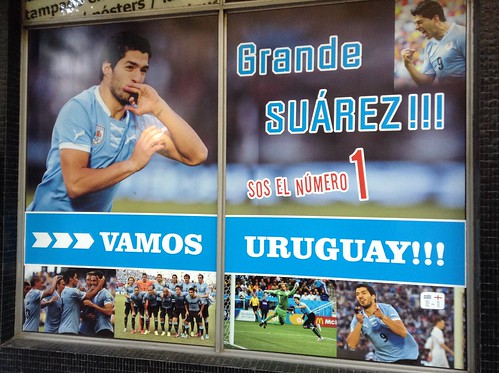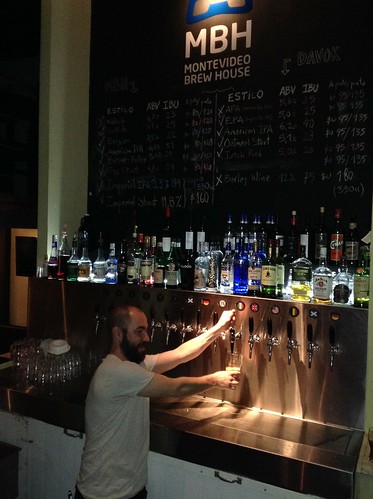It was Saturday afternoon and I’d just finished a walking tour through Montevideo’s old city, a peninsula of narrow streets and old colonial buildings with quaint shops, restaurants, book stores, museums, churches, and the delicious-smelling Mercado del Puerto with its chivitos.


Then I remembered that a sold-out production of Hamlet, being performed by the Globe Theatre’s world-traveling troupe, began at 8pm, I quickly sent an email to the theater’s press manager to see if I could get a complimentary press pass.
No response.
Waiting for a reply I went for a jog on La Rambla, a beautiful esplanade running miles along the Río de la Plata that was one of many city projects for the 1930 World Cup here.

I returned to find still no emailed response. No matter — I changed into my nicest clothes of khakis and collared shirt and walked down to the city’s grand old Teatro Solis to try my luck.
All the city’s artists and who’s who’s seemed to be milling about in their finest gowns and getups. And there I was in my wrinkled pants and shirt, ticketless. No matter! I walked up to the ticket seller, who recognized me from the week before, when I’d come to see a production of Moliere’s The Misanthrope (or the Cantankerous Lover), and he pointed me to the press manager standing right behind me. I stood nearby for a minute, then moved in for the kill with a gentle hand on the elbow, a smile, and an explanation of how I was a foreign journalist in Uruguay so very impressed that Hamlet was being performed and how I would love to attend if an extra seat might be found.

She told me to wait.
Fifteen minutes later, after watching hundreds of beautiful people file into the theater, the curtains about to go up and the lights about to go down, an assistant walked up to me with a ticket, first level and 15 rows back, center-stage. I saw the press manager and thanked her, and then she handed me another ticket for access at intermission to the VIP room with its free Chivas Regal whiskey and champagne.
The production was great. Hamlet came to life like never before. Even Shakespearean lines that normally sound worn out and clichéd took on new life. When Hamlet bounded to the front of the stage and began, “To be, or not to be,” I was thinking, “Yeah man! Be! Way to be!”
After intermission I sneaked a glass of whiskey back into the theater. As I took a sip, the young man and woman on my left — probably in their early 30s — motioned to an usher that I had a drink. The tattle-tales! I tried to stymie them by tapping the man on his knee and making conversation. Too late. An usher was soon standing behind me, asking for my glass, from which I took a big last gulp and then handed it over.
“That was weird,” I said, turning back to the man and woman. “How could he have known I had a drink? Did someone tell on me?”
“I don’t know,” the man said.
“Someone must have told on me,” I said, giving him my most prosecutorial glare. “What an obnoxious thing to do, don’t you think? Only a jerk would do that, don’t you agree?” The man and woman shrugged. The lights went down.
Afterward I went to a nearby pizzeria with a big brick-oven for a beer and a couple slices of piping hot mozzarella pizza, served to me at the bar by the chef himself, scooping the pizza out of the oven, whacking it into slices with his machete, and sliding them before me on the tiled counter. Very simple. Very pleasant.

In a way the evening summed up Uruguay, or at least Montevideo. Beautiful. Friendly. Old. Cultural. Pleasant in a simple way. But also a bit stodgy and priggish, goody-goody. I mean, who really tells on you for sneaking a drink into a theater? Were I in Brazil, my neighbor probably would have given me a thumbs up. But Uruguay seems to play by the rules a little more, seems to have a much more firm belief in the rightness of rules and the ability of authorities to dictate personal affairs. It’s now to the point of the government saying how much marijuana an Uruguayan can personally grow and buy — an approach that is seemingly liberal, but at the same time authoritarian.
Another revealing cultural experience was attending a football match at Montevideo’s old cement stadium that was built to host the 1930 World Cup, which this tiny nation won.

The top player on the field was Uruguay’s infamous forward Luis Suárez, perhaps the best Uruguayan player in decades, who made a name for himself in this year’s World Cup by literally taking a bite out of an opposing player. Wacky.

Nevertheless, Uruguayans adore him, as I wrote in a fun article for Americas Quarterly:
Ensuing memes included arecreated scene from the film Jaws, with the footballer’s face in place of the man-eating shark. The New York Times headlined its day-after article: “Uruguay’s Suárez, Known for Biting, Leaves Mark on World Cup.” Even the former U.S. boxer Evander Holyfield, whose ears were both bitten by Mike Tyson in their famous 1997 match, weighed in on the Suárez saga with this tweet: “I guess any part of the body is up for eating.”
Even at the bookstore, Suárez’s autobiography held a place of honor alongside novels by Stephen King and John Grisham, and above a book about Uruguay’s own president.

Much of my three weeks in Uruguay was spent coughing up my lungs and battling fevers from some kind of nasty respiratory infection. But I got out and about for a few more articles, including interviewing some of Uruguay’s biggest pot growers for a story in Fusion. I was repeatedly offered a hit, and the buds smelled wonderfully piney, but I didn’t trust my ability to conduct an interview while high on fresh Uruguayan pot.


Also tried some rare Uruguayan craft beers at Montevideo Brew House (the country has a total of three microbreweries, making all craft beers rare). I got to talking with the restaurant manager, who knew a lot of the small Brazilian breweries that I’d researched for my article on Brazil’s amazing but struggling start-up craft beer industry, and he gave me a bunch of free samples plus two free pints. Upstanding lad!


